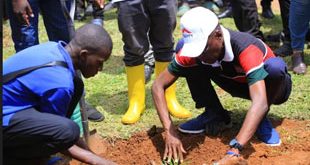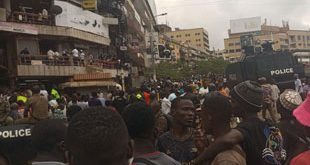
Ntoroko, Uganda | THE INDEPENDENT | More than 1,000 residents of Kanara and Bweramule sub-counties in Ntoroko district are living in deplorable conditions as water emerging from Lake Albert continues to submerge their areas.
According to area leaders, the water levels have been rising since January and continued to displace people, destroy their properties and submerging houses. The most affected areas are sub-counties and town councils that border Lake Albert which can now only be accessed by use of boats.
The recently released district floods assessment report indicated that the heavily affected areas include Kanara sub-county and Kanara town council where all the affected households have sought refuge in camps. According to the report, a total of more than 1,300 homes have been abandoned across 26 villages.
Simon Mugisa, one of the area residents says that some of the displaced people have constructed raised wooden structures to accommodate themselves. He adds that some are sleeping in the cold while others relocated to stay with relatives in safer places.
But he hastens to add that the water volumes have exposed residents to disease outbreaks with pit latrines now submerged. The other affected residents are from Butungama sub-county who have been affected by the bursting of River Semuliki banks.
Although the government had suggested acquiring land from Semuliki National Park in Kibuku to resettle the most affected, the community rejected the move urging that it was mountainous for their economic activities.
“Since February, the water had started invading the area, people refused the relocation place to Kibuku and now they are suffering without a place of abode…” Mugisa says.
Ben Mutahinga, the district chairperson says the district needs most urgent relief including more food and resettlement plans. He is worried that even animals like cows are affected by the flooding waters.
The area MP Gerrald Rwemulikya Ibanda says the affected community needs a permanent resettlement plan. He implores the government to extend more relief to the affected communities whose economic activities have been hindered.
Irene Nakasiita, the Red Cross communications manager told URN on Friday that the most critical needs of the people include access to clean and safe water, food, access to latrine facilities, medical services, psychosocial support among other critical life-saving services. Such conditions happened in 1963 and it took four years for the waters to subdue.
On Thursday, the Red Cross society offered support to more than 1400 people who were affected by the floods. Majority of the beneficiaries were women, children, the elderly and differently-abled people who are considered highly vulnerable.
Each family received a non-food relief item kit composed of 1 tarpaulin, two blankets, two mosquito nets, two jerrycans, two cooking pots, six silver plates, five silver cups, one serving spoon, 1 knife, two mats and two bars of soap among other key essential household items.
“This problem of water is too big and cannot be solved by just giving out relief. We have given kits that can enable these families to develop coping mechanisms. We hope to scale this emergency response by coming in to quickly address the WASH needs on the ground to avoid any disease outbreaks. However, government should relocate these people because this water is likely to stay for a longer period of time.” Uganda Red Cross secretary-general Robert Kwesiga said.
*****
URN
 The Independent Uganda: You get the Truth we Pay the Price
The Independent Uganda: You get the Truth we Pay the Price


